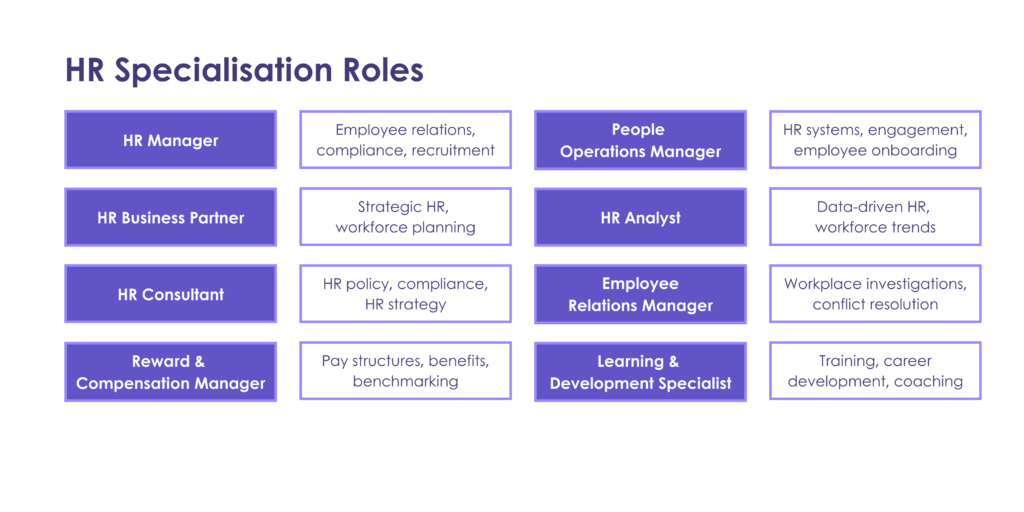Why HR Is a Smart Career Choice in 2025
Human Resources has evolved into one of the most dynamic and influential career paths in today’s working world. No longer just about administration and policy, HR professionals are at the heart of business transformation—leading change, improving employee experience, and driving growth. According to Robert Half’s 2025 Demand for Skilled Talent report, there is a high demand for HR professionals, with unemployment rates for HR managers at just 0.6%, significantly lower than the national average. This demand is particularly strong in areas like talent acquisition, training and development, and employee engagement.
Whether you’re starting fresh, returning to work, or pivoting your career, this guide explores how to enter HR, choose your specialism, and build a long-term career in this thriving industry.
What Does a Modern HR Career Path Look Like?
The HR career path isn’t strictly linear anymore. Many professionals enter through different routes and quickly find themselves in specialist or strategic positions based on skills and interest.
Curious about what you can earn in different HR specialisations and at each career stage? Explore the latest HR salary guide in the UK to know more!
Here’s a breakdown of typical roles by level:

Entry-Level (0–2 years)
HR Assistant or Administrator: Supports recruitment, onboarding, and employee queries. Great entry point for building admin and communication skills.
Skills needed: Organisation, basic HR systems, strong written communication.
Mid-Level (2–5 years)
HR Advisor, People Operations Coordinator, Talent Partner: Works with line managers, handles employee relations, or focuses on hiring.
Skills needed: Employment law knowledge, problem-solving, coaching.
Senior-Level (5–10 years)
HR Manager, Learning & Development Manager, HR Business Partner: Delivers people strategies, leads HR teams, manages performance or training frameworks.
Skills needed: Leadership, stakeholder management, strategic planning.
Strategic Level (10+ years)
Head of People, Director of HR, Chief People Officer: Shapes company culture, drives organisational change, sits on the leadership team.
Careers in HR allow for both vertical growth and lateral movement into specialist areas like L&D or analytics.
Entry Routes into HR
One of the most appealing aspects of HR careers in the UK is the variety of entry points. You don’t need a traditional HR degree to get started.
Here are some real-world routes:
- From admin or office support roles: Many HR Assistants begin in general office admin and gradually take on HR tasks.
- Via customer-facing roles: Experience in retail or hospitality helps build people skills, which transfer well into HR.
- Through education: Graduates with degrees in business, psychology, or social sciences may enter through grad schemes or HR internships.
- Apprenticeships or funded learning: Many professionals enter HR via workplace apprenticeships or career development programmes.
- With a CIPD qualification: CIPD Level 3 is a recognised entry route that builds foundational knowledge in HR. Ideal for those without a degree.
Real Story – Nicola Deacon, CIPD Level 3 Graduate
“After finishing CIPD Level 3, I got a new HR job with a much higher salary. I’m now looking at doing Level 5!”
Nicola secured a higher-paying HR job after completing CIPD Level 3. She found Avado’s supportive learning community invaluable, staying motivated through her cohort’s WhatsApp group. Watch more about Nicola’s story
Choosing Your HR Specialism

Not sure what part of HR suits you best? Think about your natural strengths and interests. Here’s a breakdown:
- Talent Acquisition: Love networking, fast-paced environments, and finding the right people for the job? Recruitment could be your thing.
- Learning & Development (L&D): If you’re passionate about teaching, coaching, or helping others grow, L&D offers creative and impactful work. Find out Top L&D Roles with CIPD
- Employee Relations (ER): Enjoy solving problems and navigating sensitive conversations? ER involves managing conflict and supporting wellbeing.
- People Analytics: Great with data and trends? Use metrics to guide decisions about hiring, retention, and engagement. Explore What is HR Analytics?
- Diversity & Inclusion: Committed to social change? Help shape equitable policies and inclusive company cultures.
- People Operations: A progressive, tech-driven approach to HR — see how it differs in People Operations vs Human Resources.
Exploring these specialisms can help you plan a tailored HR career path.
Key Skills That Employers Are Looking For
Whether you’re applying for your first HR Assistant job or aiming to become an HR Business Partner, here are the core skillsets to build:
HR Knowledge & Technical Skills:
- Understanding of employment law (e.g. contracts, grievances, policies)
- Familiarity with HRIS software (e.g. BambooHR, Workday)
- Recruitment and onboarding processes
Soft Skills:
- Empathy and listening
- Conflict resolution
- Time management and organisation
Emerging & Future Skills:
- Data analysis and reporting
- Change management
- Familiarity with HR technology and automation tools
AI & Digital Confidence in HR
As more organisations adopt people analytics, digital onboarding, and AI-assisted recruitment, HR professionals are expected to be tech-savvy and adaptable. Having confidence in using digital tools — from applicant tracking systems to generative AI — is becoming a key differentiator in the job market. Check out our 14 Best AI tools for HR Guide to stay ahead!

Common Myths About Starting a Career in HR
1. You need a degree to work in HR!
This is one of the most persistent myths — and it simply isn’t true. While some roles at senior or specialist levels may require a degree, many people start successful HR careers through professional qualifications like the CIPD Level 3 Foundation Certificate. It’s widely recognised by UK employers and designed specifically for those without previous HR experience or a university background. In fact, many learners use Level 3 to access their very first HR role and continue progressing up the career ladder.
2. Human Resource is just admin and paperwork!
While there are administrative elements, modern HR is a strategic, people-focused profession. Today’s HR teams are involved in shaping company culture, driving diversity and inclusion, building learning programmes, and implementing digital tools like AI in recruitment. If you’re passionate about improving the employee experience or helping organisations evolve, HR offers a meaningful and varied career path — far beyond filing documents or updating records.
3. HR roles are hard to find without experience!
It’s true that HR can be competitive, but many entry-level roles don’t require previous HR experience — just the right mindset, transferable skills, and some foundational knowledge. Roles like HR Assistant, HR Administrator, or People Coordinator often seek strong communicators with organisation skills and empathy — qualities you may already have. Adding a recognised qualification like CIPD Level 3 can give you a critical edge and show employers you’re serious about the profession.
Can You Start a HR Career Without a Degree or Experience?
Yes, you absolutely can! This is one of the most searched questions around HR careers in the UK — and for good reason. Employers now place more value on soft skills, emotional intelligence, and a willingness to learn than ever before. If you’re organised, empathetic, and love working with people, HR could be the right fit — degree or not. The CIPD Level 3 Foundation Certificate is perfect for beginners with no prior HR experience. For those ready to dive deeper or pivot into HR at a more advanced level, the CIPD Level 5 Associate Diploma can lead to real-world opportunities — even without a degree or work history in the field.
Real Story – Amna Khan, CIPD Level 5 Graduate
“I was losing hope because I wasn’t getting job offers. But CIPD helped me secure an internship, and within two months, I was promoted!”
Amna struggled to break into HR until she enrolled in CIPD Level 5. She quickly secured an internship and used her skills in recruitment and D&I. Within two months, she was promoted to Team Leader. Avado’s interactive sessions and structured learning helped her build the confidence to thrive. Watch more about Amna’s story
CIPD qualifications: Boost your knowledge and skills
Studying for a professional qualification is an excellent way to enhance your expertise and get a rewarding career in HR. The Chartered Institute of Personnel and Development (CIPD) offers a range of qualifications suitable for HR professionals at different stages of their careers. Starting with CIPD Level 3 for foundational knowledge and moving up to CIPD Level 7 for advanced strategic HR management skills.
These qualifications are recognised by employers as the global standard of excellence. And they show the profession you value knowledge and ethical practice:
- CIPD Level 3 Foundation Certificate in People Practice: This foundation-level course covers essential HR principles, offering a solid grounding in HR practices. It will set you off on the right HR career path.
- CIPD Level 5 Associate Diploma in People Management: This intermediate course delves into complex HR concepts, such as talent management, organisational development, and employee engagement. It will help steer you on the course for a higher salary and position.
- CIPD Level 7 Advanced Diploma in Strategic People Management: This is the pinnacle of HR excellence, designed for seasoned HR professionals or people who have completed Level 5 and are ready to tackle strategic HR management. This qualification could help you earn a salary of £80,000 and above in an HR Manager or HR Director role.
Your First Step Starts Today
HR is one of the few careers that combines people, purpose, and progression. From supporting wellbeing to shaping company culture, a career in HR is as meaningful as it is future-proof.
Whether you’re just exploring HR careers or ready to enrol in a course, remember: there’s no one “perfect” path — just your path.
Want to speak to someone about your options? Book a free consultation with an Avado advisor.

 8 min read
8 min read 




